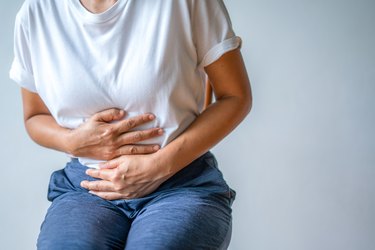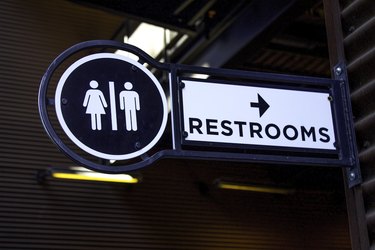
Nearly everyone experiences diarrhea from time to time, but diarrhea after every meal can be a sign of a larger problem. It may also take a bit of detective work to diagnose, as there are a number of possible causes of diarrhea after eating.
Here, learn what causes food to go "right through you" and how to stop diarrhea.
Video of the Day
First, What Kind of Diarrhea Do You Have?
The Cleveland Clinic defines mild diarrhea as loose and watery bowel movements that may be accompanied by cramping, bloating, urgency, nausea and vomiting. The condition progresses to severe diarrhea if, in addition to those symptoms, you have blood, mucus or undigested food in your stool, experience weight loss or dehydration or have severe pain or fever.
When diarrhea only lasts for a few (miserable) days, you likely have viral gastroenteritis — commonly called stomach flu. This is just an acute case of diarrhea. Chronic diarrhea, however, can last a couple of weeks and can occur with food poisoning or other underlying conditions.
If your diarrhea won't go away, or happens almost every time you eat, certain clues can help you and your doctor get to the root cause.
1. Digestive Diseases or Disorders
"The first thing I would wonder is if you have an underlying issue that has been undiagnosed," says Will Bulsiewicz, MD, a gastroenterologist with Lowcountry Gastroenterology in Mount Pleasant, South Carolina, and author of The Fiber Fueled Cookbook.
Some possibilities, he says, include:
- Celiac disease, an autoimmune disease in which eating gluten (a protein found in wheat, barley and rye) causes damage to the small intestine
- An infection such as Clostridium difficile (C. diff.), which most commonly occurs after taking antibiotics
- A parasitic infection such as giardiasis, which people typically get from drinking unclean water
- Inflammatory bowel diseases (IBD) such as ulcerative colitis, Crohn's disease or microscopic colitis
Symptoms of these conditions include:
- Blood in the stool (which can especially indicate IBD)
- Sudden watery diarrhea
- Loose stool
- Anemia or symptoms of anemia, such as fatigue, lightheadedness, weakness and weight loss
- Diarrhea that disrupts sleep
We know viral gastroenteritis is the "stomach flu," but there are several strains of viruses that can cause it. These include the following, per the National Institute of Diabetes and Digestive and Kidney Diseases (NIDDK):
- Norovirus: One of the most common strains. Symptoms begin 12 to 48 hours after you come into contact with the virus and last 1 to 3 days.
- Rotavirus: Symptoms begin 2 days after exposure and last 3 to 8 days. Vaccines to prevent this virus are available.
- Adenovirus: Symptoms begin 3 to 10 days after exposure and last 1 to 2 weeks.
- Astrovirus: Symptoms begin 4 to 5 days after exposure and last 1 to 4 days.
While norovirus can affect people of all ages, the remaining mostly affect infants and children. Most of these viruses peak in the wintertime, but you can get infected any time of year.
3. Gallbladder or Pancreas Issues
Chronic diarrhea may also affect people who have gallbladder problems or have had their gallbladder removed.
"That is not uncommon — about 10 percent of people who have had their gallbladder removed develop chronic diarrhea, or bile salt enteropathy," Dr. Bulsiewicz says, adding that "it's quite easy to treat once it's diagnosed."
This is also known as bile acid diarrhea, which can cause yellow diarrhea and stool, per the Mayo Clinic.
In some people, the underlying problem may stem from pancreatic insufficiency, which impairs the absorption of fats in the small intestine.
4. Irritable Bowel Syndrome
Irritable bowel syndrome (IBS) is the most common cause of chronic diarrhea after eating. Though less debilitating than IBD or celiac disease, IBS can still have a serious negative effect on your quality of life.
"The entire gut is wired together — the stomach talks to the colon, the colon talks to the stomach," Dr. Bulsiewicz explains. "When the stomach receives food, it sends a signal to the colon to start to move and make room."
Normally, this reflex triggers a healthy bowel movement after eating. But in someone with IBS, the reflex is over-stimulated — aka an overactive gastrocolic reflex — which leads to diarrhea after a meal.
An overactive gastrocolic reflex can cause you to take trips to the bathroom almost immediately after eating, and cause more of a liquid diarrhea versus firm stool.
Other symptoms of overactive gastrocolic reflex include the following, per the National Library of Medicine:
- Bloating
- Excessive gas
- Abdominal pain
- Tenesmus (the feeling that you need to pass stool, but your bowels are empty)
5. Food Allergies and Intolerances
If the diarrhea follows a specific pattern — say, chronic but sporadic — that could indicate a food intolerance or food allergy.
According to the Mayo Clinic, people with a food intolerance may be able to ingest small amounts of those foods without consequence, but a true food allergy will be set off by even the smallest amount of the food or food component in question.
While fish, shellfish, peanuts and tree nuts cause most of the food allergies in adults, the foods most likely to trigger diarrhea are dairy, which can be especially difficult for people with an intolerance to lactose, fructose or artificial sweeteners.
6. Food Poisoning
Sometimes, you may have diarrhea after eating if you ate something bad. Expired, undercooked or moldy food can upset your stomach, causing explosive diarrhea and even throwing up after eating. Some examples include undercooked red meat, or eating a salad that has bad lettuce.
Some other common food poisoning symptoms can include the following, per the Centers for Disease Control and Prevention (CDC):
- Stomach pain or cramps
- Nausea
- Fever
- Chills
- Sweating
- Dehydration
The most common bacteria that cause food poisoning include salmonella and E. coli. These can be found in undercooked meats, eggs and on unwashed fruits and vegetables. Food services and/or the FDA will often put out a recall if the contamination is widespread.
To prevent food poisoning, make sure you are thoroughly cooking your meat and protein sources and washing your produce before eating. Check the expiration dates on food labels and make sure no products have signs of mold or rot.
Food poisoning symptoms could last a few hours to a few days, depending on the type of bacteria you consumed, per the CDC.
Warning
If you experience bloody diarrhea, diarrhea that lasts for more than three days, high fever, vomiting to the point you can't keep liquids down and dehydration, visit your doctor as soon as possible, who may suggest a trip to the emergency room for treatment, per the CDC.
7. Endocrine Disorders
Hyperthyroidism (aka an overactive thyroid) is an endocrine disorder in which the thyroid gland makes too much thyroid hormone. This can lead to symptoms like chronic diarrhea after eating as well as the following, per the National Library of Medicine:
- Irritability or nervousness
- Fatigue
- Muscle weakness
- Trouble sleeping
- Tremor (usually in the hands)
- Irregular heartbeat
- Weight loss
- Mood swings
- Goiter (an enlarged thyroid that may cause your neck to look swollen)
Diabetes is another endocrine disorder that can affect your digestive system. Nerve damage is a common symptom, which can lead to nerve damage in your GI tract, too. This could lead to diarrhea and other gastrointestinal issues after eating larger meals, per the Cleveland Clinic.
Other symptoms of diabetes include the following, according to the CDC:
- Peeing a lot (including at night)
- Feeling very thirsty and/or hungry
- Losing weight without trying
- Blurred vision
- Numb or tingling hands or feet
- Fatigue
- Very dry skin
- Sores that heal slowly
Tip
The diabetes medication metformin can come with a variety of side effects, including diarrhea, per the Cleveland Clinic.
8. Antibiotics
About 1 in 5 people who take antibiotics develop antibiotic-associated diarrhea, per the Mayo Clinic.
Diarrhea will typically subside once you stop taking the medication, but that doesn't make it any less pleasant while taking it.
You can try taking antibiotics with food to help ease stomach pain and upset, but it may also increase your chances of diarrhea and undigested food, per the Mayo Clinic.
Tip
There are also supplements that can cause diarrhea, such as vitamin C, zinc, fish oil and magnesium, per Consumer Lab.
9. Dumping Syndrome
Dumping syndrome is a group of symptoms — including diarrhea, nausea, lightheadedness and fatigue — that occurs after a meal. It typically happens when you have a condition called rapid gastric emptying, per the NIDDK.
Rapid gastric emptying is when food moves too quickly through your stomach — approximately 30 minutes to three hours after a meal.
You're more likely to develop dumping syndrome after you've had stomach or esophagus surgery or weight-loss surgery.
If this is the case, your doctor may recommend changes like eating six small meals a day, laying down after eating and eating more fiber to help relieve diarrhea.
Treatment for Diarrhea After Eating
You may be wondering what helps diarrhea. A proper diarrhea remedy will depend on the cause.
If your diarrhea is caused by a bacterial infection, a course of antibiotics will likely be prescribed by your doctor. Viral infections typically clear up on their own, but your doctor may recommend rest and fluids until your symptoms subside.
If your diarrhea is caused by IBS, your doctor may recommend specific dietary and behavioral changes to help manage your symptoms.
If your diarrhea is caused by an underlying condition, it's best to see your doctor for a diagnosis and a treatment plan. If you're already being treated, there are a few natural remedies for diarrhea you can try for relief, including:
- Eating foods high in soluble fiber, like apples, oats and citrus fruits, which can help firm up your stool
- Staying properly hydrated (getting 11.5 to 15.5 cups of fluid daily through drinking or water-rich foods)
- Taking probiotics
- Avoiding artificial sweeteners
- Avoiding dairy, fatty/fried foods and spicy food
- Avoiding caffeine and alcohol
If you do get hungry, it can be tough to determine what foods to eat when you have diarrhea. Try sticking with bland and easy-to-digest foods, like white bread, potatoes, plain yogurt, canned fruit or eggs until your symptoms are gone.
When to See a Doctor About Diarrhea After Eating
The Cleveland Clinic recommends getting medical attention if you have severe diarrhea, especially with a fever lasting more than 24 hours, or if you're unable to drink or retain fluids because of vomiting.
"You should definitely see a doctor if you have any of those red-flag symptoms," Dr. Bulsiewicz says. "But I would add that any person whose diarrhea is affecting their quality of life has enough reason to see a doctor."
FAQ
1. How Quickly Can You Get Diarrhea After Eating?
You can get diarrhea as soon as 30 minutes after eating, especially if you ate bad food, per the CDC.
After you eat, it typically takes anywhere from six to eight hours for food to pass through your stomach and small intestine, per the Mayo Clinic. But if the food is not agreeing with your GI tract, it will pass through more quickly, causing diarrhea and stomach upset.
2. What Foods Stop Diarrhea Fast?
While there's no miracle foods guaranteed to stop diarrhea fast, there are some elements of the BRAT diet (bananas, rice, applesauce and toast) that are helpful, per the Cleveland Clinic.
While the BRAT diet is not always recommended anymore (because it lacks many essential nutrients), each individual food could soothe your stomach and help firm up stool in the short term.
3. When Should I Be Concerned About Diarrhea?
You should be concerned about diarrhea if it lasts longer than two days, you're dehydrated and cannot keep food or water down, you have severe abdominal pain, you have blood in your stool or a fever of 102 degrees Fahrenheit or higher, per Houston Methodist Hospital.
In this case, visit your doctor or nearest emergency room as soon as you can.
- Cleveland Clinic: “Diarrhea”
- Mayo Clinic: “Food Allergy”
- NIDDK: "Symptoms and Causes of Viral Gastroenteritis"
- Mayo Clinic: "Novel approaches to the diagnosis of bile acid diarrhea"
- NLM: "Physiology, Gastrocolic Reflex"
- Cleveland Clinic: "Diabetes-Related Diarrhea"
- Mayo Clinic: "Antibiotic-Associated Diarrhea"
- NIDDK: "Dumping Syndrome"
- Consumer Lab: "Which supplements can cause diarrhea?"
- Mayo Clinic: "Digestion: How Long Does It Take?"
- Cleveland Clinic: "Mom's Advice Is Still the Best for Treating Diarrhea"
- Houston Methodist Hospital: "When to See a Doctor for Diarrhea"
- National Library of Medicine: "Hyperthyroidism"
- Centers for Disease Control and Prevention: "Diabetes Symptoms"
Is this an emergency? If you are experiencing serious medical symptoms, please see the National Library of Medicine’s list of signs you need emergency medical attention or call 911.





